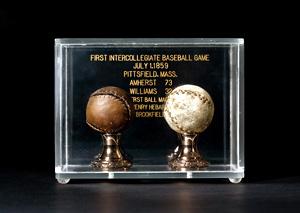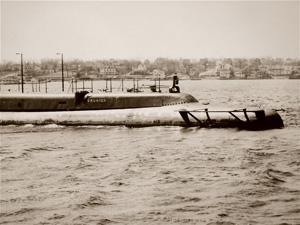 |
150 years of baseball
In his informative article on Amherst’s baseball tradition, Roger M. Williams ’56 chides the Yale Alumni Magazine for crediting the 1865 Yale-Wesleyan match as the first intercollegiate game, an honor rightfully belonging to Amherst’s tilt with Williams six years earlier (“Baseball’s Ph.D.s,” Spring 2009). Here’s hoping no one from Yale noticed the proud but arithmetically challenged proclamation “250 years of baseball” on that Amherst issue’s cover. We were first—but not by quite that much.
Christopher J. Peters ’89, Royal Oak, Mich
Mr. Peters is of course correct. While the spring magazine cover and table of contents refer to 250 years of intercollegiate baseball, the first game, between Amherst and Williams, was played a mere 150 years ago. We apologize for the mistake. —Editor
I read with great interest Roger Williams’ article “Baseball’s Ph.D.s,” not the least because I participated in a 1976 reenactment of the 1859 baseball and chess matches. I represented Amherst on the chess team, along with John Conner ’77 and John Brock ’77, if I recall correctly. Unlike the original 1859 contest as reported by Williams, the chess match was played at the same time as the baseball, on the sidelines, which made for very nerve-wracking play, especially every time a foul ball was hit in our direction. The chess match was tied 2-2 in “regulation,” and I played a “5-min” playoff game against my Williams opponent, winning easily to notch a victory for Amherst. The baseball team likewise won its reenactment, after which a regular baseball game was played. For the reenactment, the baseball players on both sides wore traditional uniforms, and the oddest thing to my mind was that instead of bases, there were poles that the players had to tag. It all made for an enjoyable day for the participants on both sides and the spectators.
David W. Chu ’77 , Middletown, Conn.
 |
The long-lost submarine
As soon as I picked up the mail and saw your cover story in the Spring 2009 issue (“Flowers on the Water”), I dropped everything else and read it from start to finish, pausing only to wipe tears from my eyes. Congratulations on a wonderful article and on the great illustrations, which answer all the questions about the incident as well as they presently can be answered. Please forgive me for pointing out one minor flaw, which, as the son of a World War II Navy veteran, I couldn’t help noticing: by longstanding convention, submarines are called “boats,” not “ships,” even though some nowadays are quite large.
Paul Tullis , Ft. Worth, Texas
Rand Richards Cooper’s story of the search for the sub Grunion was a wonderful story, beautifully told. I don’t know when I have read a tale that was both so absorbing and so moving. Congratulations to both Mr. Cooper and Mr. Abele on a remarkable accomplishment and superlative telling.
Laurence N. Wesson ’71 , Blue Bell, Pa.
I have enjoyed the Amherst magazine for a good many years but never read anything as thrilling and moving as Rand Cooper’s “Flowers on the Water.” To mimic E.B. White: Some story!
Barbara H. Davis , Wakefield, R.I.
Thanks to John Abele ’59, we were able to read the interesting history of the 1942 missing submarine captained by his father. This was fabulously written by Rand Cooper ’80. Right now, there is discussion about the Frost Library devoting some special space to recognize alumni service in the military. The sponsorship of this space by the Class of 1946 is being considered.
Archives and Special Collections at the library is especially interested in donations of pictures, letters, journals and stories that relate to the military service of alumni, in order that current and future students may learn first-hand about the experiences of many past students who served their country in times of war. The space and materials collected would complement the War Memorial, facing Frost, dedicated in 1946 (in a ceremony attended by Gen. Eisenhower and Professor Dwight Salmon) in commemoration of alumni who died in World Wars I and II.
Already available in the archives is a 50-minute DVD with “war stories” of 12 members of the Class of 1946, completed at our 60th reunion and with an introduction by Tom Brokaw.
Marvin “Moose” Newman ’46 , New Canaan, Conn.
School uniforms work
Katie Bacon’s story on the charter school founded by Yutaka Tamura ’94 (“The Experiment,” Spring 2009) was encouragement for those who know the importance of a decent education as key to opportunity for as many students as possible.
But the quotations from people who question the rigid behavior standards were bizarre. An orderly atmosphere is a prerequisite to education. When I taught in South Central L.A., those middle schools that enforced a dress code including school uniforms were measurably less disrupted than those that didn’t. By denying self-expression through clothing, the kids were forced into arenas where they could develop useful communication skills.
Any praise for the culture of “children of color” at the expense of orderly days is naive to the point of ignorance. The fact is that violence, chaos and illiteracy—often features of the culture these students come from—are the very problems these schools must overcome. Would Ms. Wilusz and Ms. Ravitch propose teaching Ebonics as the full projection of their own sensitivity?
Finally, I did teach at the Alternative Learning Center here in Austin, Texas, a place for kids who had been difficult to manage. Uniforms and regimentation to the point of lining up to go to class, lunch and restrooms were enforced, but not a day went by that some student did not tell me they preferred this atmosphere because their home schools were “too crazy.”
Paul Ehrmann ’65, Austin, Texas
Not all darkness and pain
In a letter that appeared in the Spring 2009 issue of Amherst, Dr. Michael Robbins ’55 suggests that Amherst College paid insufficient attention to David Foster Wallace’s severe depression while he was a student there and even neglected him. David, my son, had a great many friends at Amherst, including faculty members and students. Due in no small measure to the generous and loving support of these friends, David’s time at Amherst was by no means all darkness and pain. His mother and I are deeply grateful to David’s Amherst friends for all they did to help and support him. I am glad David went to Amherst.
James D. Wallace ’59 , Urbana, Ill.
Khalidi at Amherst
I found Rashid Khalidi’s quote in “Verbatim” suggesting that the United States is responsible for the 9/11 attacks to be neither snappy nor thought-provoking but merely offensive (College Row, Spring 2009). Why did you publish and thereby acknowledge such mindless drivel? Furthermore, why does Amherst invite such people to speak? I would expect such a person to be teaching at Columbia, an institution that provided a platform for someone who denies the Holocaust as well as the existence of homosexuality in his country and calls for the destruction of Israel, but I expect more of Amherst.
Who’s next at Keefe, Hugo Chávez?
Joseph Krainin ’98, M.D., Ann Arbor, Mich.
Cause for celebration—finally
As critics of Amherst’s decades-long, unrelenting hostility to the American military, it is incumbent upon us to note this tiny but encouraging sign of change.
Admission Dean Tom Parker reports that one combat veteran of the Iraq-Afghan war theater has been admitted to the Class of 2011 as a transfer student from a Massachusetts community college.
That veteran will be supported through a combination of federal government funds from the new G.I. Bill plus tuition support from an Amherst scholarship fund for veterans that now totals more than $1 million. The college will also add financial support from its general scholarship funds.
Credit for spearheading that veterans’ scholarship fund, in addition to Amherst President Tony Marx, who was supportive, goes to Army Lt. Paul Rieckhoff ’98, whom we profiled in these pages shortly after he finished his combat tour of duty in Iraq (“A Soldier’s Tale,” Summer 2004). Paul went on to found IAVA—Iraq and Afghanistan Veterans of America, probably the foremost 21st-century advocacy group for veterans in the country.
Dean Parker tells us he is working with two Army Rangers as to the most effective way to apply to Amherst, which will probably be to attend a community college for a year prior to applying to Amherst.
For decades, Amherst undergraduates and graduates looked (or fled) the other way as the burden of serving and fighting in our military was left to “others”—preferably those with less privileged academic credentials.
It is past time that Amherst honored these men and women, and shared their burden.
With the appearance of this lone soldier on the Amherst campus, and the small trickle of Amherst graduates who have joined (or are joining) the military since 9/11, it looks from this distance that a shameful part of Amherst’s elitist culture is heading for the proverbial ash heap of history.
That is cause for celebration.
Dick Hubert ’60 , Rye Brook, N.Y.
Rob Longsworth ’99, New York City
Editor’s note
We are happy to announce that the Council for the Advancement and Support of Education, which runs the leading awards program for college and university periodicals, has awarded Amherst magazine a gold medal in the Best Articles of the Year category for our Winter 2008 feature “Ghost Writer,” by Rand Richards Cooper ’80.
Top photo by Samuel Masinter '04. Lower photo courtesy of Bruce and John Abele.